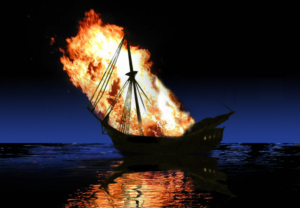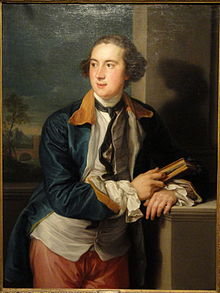Americanism Redux
August 26, 250 years ago today
I’m turning this thing around…today! No more tricks, no more games, no more local-yokel garbage that delays and delays and delays until everyone just forgets and the thing disappears. No more. Today is when it starts and it starts with me and my pronouncement.
The damn people burned my boat…uh…our boat…uh…our vessel…uh…our Official Governmentally-Approved and Sanctioned Enforcement apparatus to stop the smugglers and make them pay what they’re obligated to pay.
That’s what I’m doing today and all ye shall know it.
Essentially, boiled down, these are the words emanating from the throne of Great Britain, spoke and written by the ruler God has entrusted to lead the nation. George III, the British King, the imperial monarch, has declared, today, 250 years ago this policy is now in place.
George III
Three months ago, in the bay waters between Passeonkquis Cove and Occupessatuxet Cove on Providence River in Rhode Island, a small group of local protestors had burned the HMS—His Majesty’s Ship—Gaspee, a schooner tasked with enforcing imperial trade laws. The protestors also shot and wounded the vessel’s commander. They belonged to an armed protest group called the Sons of Liberty which had emerged back in the mid-’60s when British-colonial relations had descended into violence, rioting, chaos.
HMS Gaspee
King George III had been on the throne for less than five years in those days. Now, he’s resolved—the thugs who attacked the Gaspee must be found and punished.
Today, 250 years ago, George III announces the forming of a Royal Commission of Inquiry. It will have one task and one task only: “for the discovering and apprehending the Persons who plundered and burned the Gaspee schooner.” The Royal Governor of Rhode Island, Joseph Wanton, whose name literally meant destruction, would lead the commission. British legal officials would serve with Wanton.
So there, let the damn thing begin. Today turns it around for my kingdom and this realm. The vessel enforcing the law and attacked for having enforced the law will have justice done.
Also today, the newest member of George III’s government sees a problem ahead. He is William Legge, formally named as the 2nd Earl of Dartmouth. His role in the imperial government is only hours old—he is the new “Secretary of State for the Colonies and First Lord of Trade.” Long title and probably the third most powerful office in British-colonial relations after the monarch and the prime minister.
William Legge, 2nd Earl of Dartmouth
He enjoys wide popularity in the British colonies, so wide in fact that the black teenaged poet Phillis Wheatley is thinking about writing a poem to honor him; it would be an attractive choice in the marketplace. In addition, a college has been named after him just a few years ago, Dartmouth College in New Hampshire colony. A lot of his friends in New England especially hope he can continue to soften, improve, bolster, lighten up—pick your word that means “get better”—the feelings bruised in the worst days of British-colonial relations. After all, the blood spilled in the so-called Boston Massacre has been dry for barely two years. Tensions can still be felt, grimaces still be seen with the wrong touch.
Yes, it’s clear, the 2nd Earl of Dartmouth could be the right man at the right time with the right challenge in today’s announcement of the Royal Commission of Inquiry. It’s the first item on his to-do list.
His King expects a result. His fan club in New England will expect a result. Now the question is how in God’s name can he see to it that the same result will answer both ends.
Also
The small things can have such gigantic meanings, sometimes, not all the time, but sometimes. The maddening part of it is the most important part of it—how to discern when it is and isn’t one of those times.
George III, 34-years old and a voracious reader, believes down to his bones that the British Empire needs a stronger hand in the monarchy. He sees himself as central to a deep change in British political life, a change from a period of corruption and flabbiness to one of institutional vigor, proper administration, and global leadership. And he’s decided that the disorder between Britain and its North American colonies back in the 1760s can’t be allowed to worsen. He defines worsening as deterioration to the point of separation. That won’t happen on his watch, he thinks, not so long as I’m living.
That’s why he’s drawing the line with the Gaspee. It’s one boat, one vessel, one enforcement device, but it’s a symbol to him of something much, much larger.
Here we encounter a question of a profound nature—how many other people agree with him? Further, if they do, is their agreement on the same basis as his outlook?
You can agree with him all the way. Yes, it’s the hinge of the British Empire and now is the time to make it meaningful.
Or you can agree with him part of the way but in two different and opposite directions. Yes, it’s the hinge but let’s back off, we’ll enforce another day. OR, yes, it’s the hinge and it’s completely wrong because the very door itself, the door to which the hinge is attached, is actually what is wrong: in other words, the Empire is what’s wrong.
Likely the people who burned the boat are in this last group. Yes, the King is right, it’s symbolic of something big. It’s our view, though, that the big thing is who governs who and under what understanding the governing occurs.
And back we go to an office like that held by the 2nd Earl of Dartmouth on today, 250 years ago. A tough job lies ahead.
You Now
Keep in mind a couple of things. I could have gone straight with the language of the day in sharing this story. Lengthy quotations featuring the verbiage and all the rest. I purposely didn’t. My view is that I want you to feel the impact of the day-to-day 250 years ago in terms that mean the most to you. The language may or may not facilitate that. My choice is that my language and style as seen today was the best fit for you and for our purpose. Some people might criticize me for too much “presentism” in sharing today’s story. Frankly, I couldn’t care less.
Know also that each day’s story rises out of the lives lived by millions of people. The inevitable truth of it is that the risen story then returns to those same millions of living lives. Which is to say this: don’t ever forget that this story exists within all of the other things that are true for their moment—status hardened by wealth and inheritance, extreme dangers of environment and physical reality, offensive practices and structures like slavery, the limitations of capturing and moving information, medical traditions, the nature of economic opportunity, and so forth.
I want you to feel in your gut the reality of what it meant to be there today
To me, a substantial part of the reality is the complexity of the decisions. Part of the drama, too. How and when to draw the line? How and when to keep pushing, to see if the line moves? How and when to include other factors and forces and when not to include? These questions demand to be answered in situations like this.
Suggestion
How do you reconcile two opposing ends that are placed upon you? What’s in your mental process in dealing with opposing ends? What takes you to the point at which you discard one end entirely?










